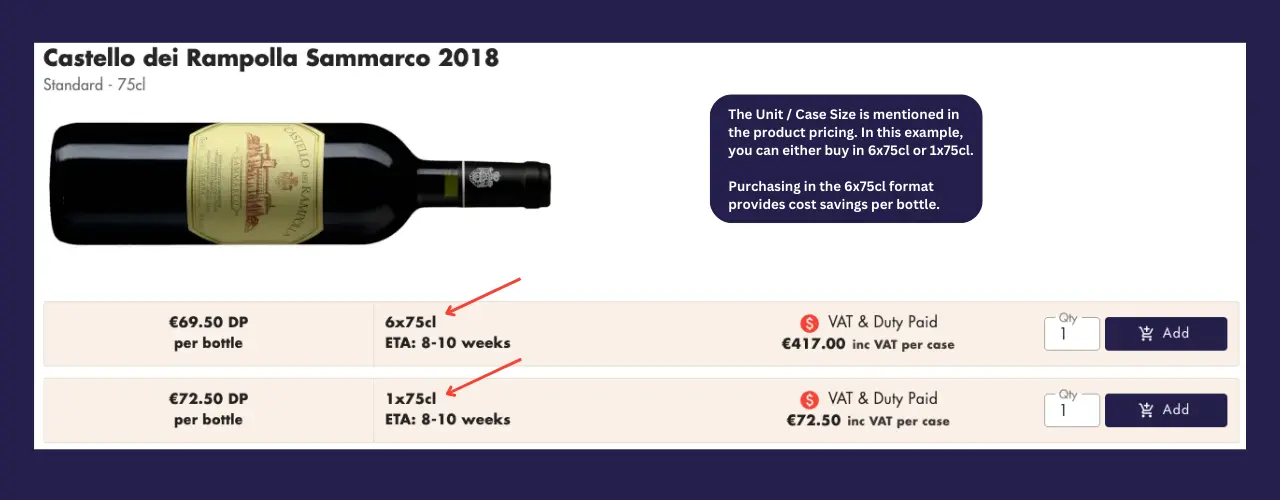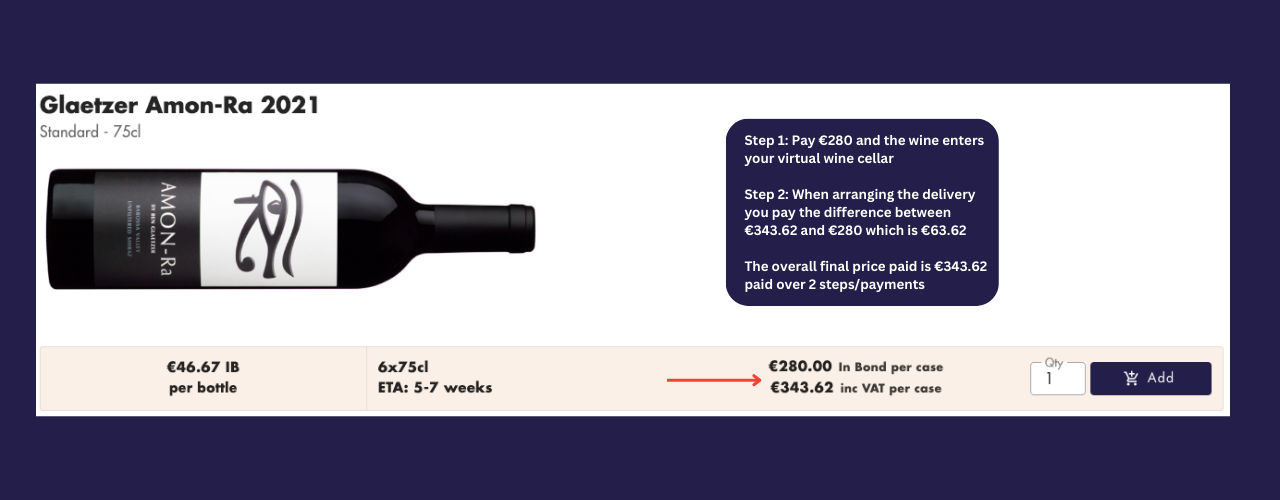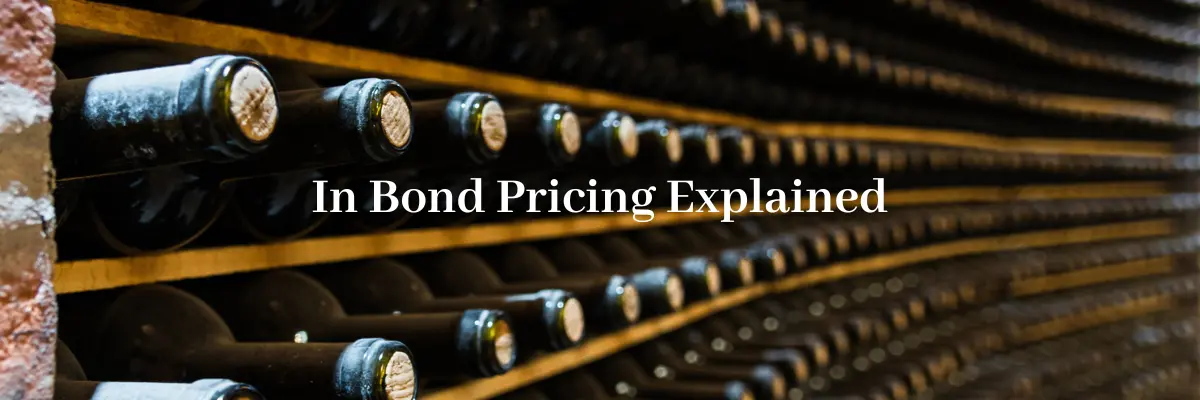Our Pricing Explained
Understanding The Product Pages: In Bond vs Duty Paid
You will be seeing two prices on our product pages and they are In Bond and Duty Paid inc VAT.
- In Bond - this is the price of the wine without paying local duty and VAT taxes
- Duty Paid inc VAT - this is the total price you would pay for the wine once you arrange home delivery. Additional delivery fees may apply depending on your location and order size.
"In Bond" buying is a term used in fine wine collecting and trading that refers to the purchase and storage of wine in a bonded warehouse approved by the government. When purchasing wine in bond, the buyer defers payment of excise duty and Value Added Tax (VAT or BTW in Dutch) until the wine is removed from the bond. This means that the buyer does not have to pay duty or VAT upfront, which results in a more flexible cash flow and cost savings.
Wine stored in a bonded warehouse is regularly monitored for optimal conditions and traceability. This practice protects wine against counterfeiting, verifies its authenticity, and increases marketability. In summary, buying wine in bond offers financial flexibility, preservation, and potential cost savings for collectors and investors. Buying In Bond is also a preferred method for En Primeur buyers.
When purchasing wine, the final price is determined by three components: the selling price (also known as the In Bond or IB price), the duty, and the local value-added tax (VAT/BTW).
Per Unit / Case Pricing
In order to offer competitive pricing and incentives to our customers, we operate as a 'case merchant' with a focus on promoting full case purchases. We understand that customers may prefer the option to buy and try a variety of wines, and thus, we make an effort to provide single-bottle options whenever possible. This allows our clients to broaden their wine selection and enjoy a diverse range of wines while still benefiting from our competitive pricing structure.
Our prices are quoted per unit, and the unit size is specified in the item description. The case sizes we commonly offer, but are not limited to, include: 1x75cl, 3x75cl, 6x75cl, 12x75cl, 3x150cl, and 12x37.5cl. By providing the case size information, we aim to provide transparency and clarity in our pricing structure, enabling customers to make informed purchasing decisions.
A price per bottle is given as an indication only and unit size is final.

In Bond Price Example:
In our 'How to Order' section we explain that we have a 2-step process for buying wine.
Step 1 - Buying the wine: Place the wine in your basket and buy the wine at the checkout using the In Bond price of €280 per case. Once the order is confirmed, the wine will enter your virtual wine storage/portfolio.
Wine storage: Not planning on drinking the wine right away? Then you can leave it in storage paying a monthly fee until you are ready to arrange home delivery. Our storage rates can be viewed here.
Step 2 - Arrange Home Delivery: Log into your account, and select the wines that you want to arrange delivery for. Pay the duty and VAT which in this example is €63.62 (the difference between €343.62 and €280.00) and the warehouse will automatically dispatch the wine to you. The final price paid is therefor €343.62 as advertised.

Duty Paid Price Example:
Certain wines are not eligible to be purchased "In Bond," which means that the duty and VAT/BTW must be settled at the checkout. It is important to note that the duty-paid status of a wine does not affect its quality; rather, it signifies that the decision was made to pay the government duty upon the wine's arrival in the Netherlands. Wines marked as duty paid can be identified by the orange $ sign and the status "VAT & Duty Paid."
In this specific example, the total price of the six-bottle case, inclusive of duty and VAT, amounts to €417.00 which is the final amount.

Frequently Asked Questions about Buying Wine in Bond
What does it mean to buy wine in bond?
When you buy wine in bond, it means purchasing and storing wine in a bonded warehouse approved by the government. This allows you to defer paying excise duty and VAT until you decide to remove the wine from the bond.
What are the advantages of buying wine in bond?
There are several advantages to buying wine in bond, including:
- Economical Cash Flow: By deferring the payment of duty and VAT until you decide to remove the wine from bond, buying wine in bond allows for a more economical cash flow. For example, you can purchase 10 cases of Bordeaux now and pay the duty and VAT in 5 years when you are ready to enjoy them, resulting in better financial planning.
- Avoidance of Duty and VAT on Resale: If you decide to sell the wine to someone else, the duty and VAT were never paid, allowing for potential cost savings and increased profitability.
- Enhanced Provenance and Traceability: Wines stored in bond have better provenance and traceability, offering protection against counterfeit or fake wines. This gives you peace of mind and ensures the authenticity and quality of your investment.
- Attractiveness to Buyers and Brokers: In bond wines are more attractive to prospective buyers and brokers when it comes to selling your collection. The bonded status verifies the quality and storage conditions of the wine, increasing its desirability and potential resale value.
- VAT based on Initial Purchase Price: If you choose to have the wine delivered a few years after purchase, you will only pay the VAT amount based on the initial purchase price, rather than the current market value. This can be advantageous when buying prestigious wines that appreciate in value over time.
- Avoidance of Local Duty and VAT on Export: If you decide to export the wine after purchase, you can avoid paying local duty and VAT, resulting in potential cost savings for international buyers.
Can the duty and VAT rates change?
Yes, the government has the authority to change the duty and VAT rates. These rates can be adjusted by the government based on various factors such as economic conditions, fiscal policy objectives, and government revenue needs. The duty and VAT on wine, particularly those purchased In Bond, can be modified by the government. These modifications may result in an increase or decrease in the duty-paid price for wine. The specific changes are contingent upon the government's strategic plans and policies regarding taxation and revenue generation.
How long can I store wine in bond?
You can store wine in bond for an unlimited amount of time. However, it's important to check with the specific bonded warehouse for any time limits or storage fees they may impose.
Can I sell wine purchased in bond?
Yes, you can sell wine purchased in bond. However, it must remain in bond until the sale is completed in order to maintain its duty and VAT advantage.
Are there any restrictions when buying wine in bond?
There are no restrictions on who can buy wine in bond. However, it's important to note that the wine must be stored in a certified bonded warehouse in order to maintain the benefits of buying in bond.
How do I remove wine from bond?
To remove wine from bond, you will need to pay the applicable excise duty and VAT. You can then arrange for the wine to be delivered to your preferred location.
How can I pay the duty and VAT/BTW?
The Fine Wine Library takes care of this for you when you arrange the delivery of your order by logging into your account and selecting the wines you want to have delivered.
Can I drink wine that is stored in bond?
No, wine stored in bond cannot be consumed while it remains in bond. It must be removed from bond and the necessary duty and VAT paid before it can be enjoyed.
Are there any risks involved with buying wine in bond?
Buying wine in bond carries minimal risks as long as you choose a reputable bonded warehouse. It's important to ensure that the warehouse maintains proper storage conditions and insurance coverage for your wine.

